MER Bookshelf – February 2025
Curated by Melissa Joplin Higley
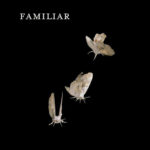 Julia C. Alter, Some Dark Familiar, Green Writers Press, April 2024, poetry
Julia C. Alter, Some Dark Familiar, Green Writers Press, April 2024, poetry
Julia C. Alter’s Some Dark Familiar begins as an excavation of the shadow sides of motherhood– often hidden from plain sight and public view. In the collection, Alter turns an unflinching eye on postpartum depression, maternal ambivalence, pregnancy termination, and the complex weaving of sexuality with motherhood. However, the author knows that no shadows are cast without light. Some Dark Familiar also seeks to illuminate the reclaiming of erotic power/true selfhood after giving birth. By the close of the collection, the book becomes a love letter from a single mother to her only son; a son being raised in America during the last gasps of the patriarchy, in the face of all of its interpersonal and ecological violence.
 Suzanne Kamata, Cinnamon Beach, Wyatt-Mackenzie Publishing, September 2024, literary fiction (novel)
Suzanne Kamata, Cinnamon Beach, Wyatt-Mackenzie Publishing, September 2024, literary fiction (novel)
Cinnamon Beach is a multicultural tragicomedy, told from three female perspectives, in which an American writer living in Japan returns to South Carolina to scatter the ashes of her brother while trying to maintain the “perfect-family” facade she created from afar, and support her Indian American sister-in-law who wants a future which might upset everyone. Sparks fly at an impromptu book-signing when the author reconnects with her college friend, now a famous African American country music star, and her daughter who is deaf finds ways to communicate with a secret first-love.
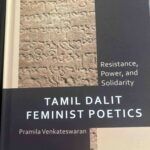 Pramila Venkateswaran, Tamil Dalit Feminist Poetics: Resistance, Power, and Solidarity, Rowman and Littlefield, November 2024, nonfiction (literary criticism)
Pramila Venkateswaran, Tamil Dalit Feminist Poetics: Resistance, Power, and Solidarity, Rowman and Littlefield, November 2024, nonfiction (literary criticism)
Tamil Dalit feminist poets and their allies challenge literary expectations set for women poets as well as caste stigma. Sukirtharani, Arangamallika, Umadevi, and Meena Kandasamy, and Tamil feminist allies, such as Malathi Maitri and Kutty Revathi, challenge the literary tradition of Tamil poetry by presenting their radical poems on themes based on their experiences as women, as mothers, and as daughters, and their witnessing of the trauma of violence on Dalit women’s bodies, thus placing caste and gender at the center of their work. They assert their subjectivity, offering us a feminist poetics that is rich with insights on the Dalit female body, spirituality, music, culture, Dalit connection to land, and democracy. Their poems theorize women’s experiences, using metaphor, symbol, folk idioms, as well as satire and irony to express feminist connectedness to all spheres of life. Replete with the new knowledge of language, form, and content, Tamil Dalit feminist poets reframe both feminism and contemporary Tamil poetry. Dalit feminist poetry and their other cultural productions are vehicles that enable solidarity and democracy.
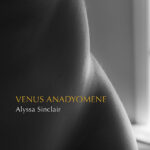 Alyssa Sinclair, Venus Anadyomene, Finishing Line Press, January 2025, poetry (chapbook)
Alyssa Sinclair, Venus Anadyomene, Finishing Line Press, January 2025, poetry (chapbook)
Venus Anadyomene chronicles the trauma and change endured by a woman’s body through pregnancy and childbirth, while exploring the intersection of mental and physical health. The poems in this book consider the threat of climate change, parenting and existing as a woman within the political landscape in Texas, and a mother’s longing for a safer and more beautiful existence for her children. These poems play with form and voice, including prose poems, word games and prayers that evoke the visceral, the spiritual, and how we exist in between.
 Sharon White, Minato Sketches, Minerva Rising Press, January 2025, literary fiction (novel)
Sharon White, Minato Sketches, Minerva Rising Press, January 2025, literary fiction (novel)
Gigi, an art historian, wants to regain control over her life after her stroke. She leaves her husband and sons in the United States to teach art history for the summer at a university in Tokyo, where she once fell in love. As Gigi explores the unfamiliar landscape in Japan —shimmering temple gardens, a monkey preserve, and a Super Mario go-cart tour — she feels renewed. But when her friendship with Richard, a colleague who abandoned his family years before to teach dance in Japan, becomes an obsession with seeing wild boars in the exclusion zone of the Fukushima Disaster, she discovers her recovery is part of the fabric of loss and rebirth.
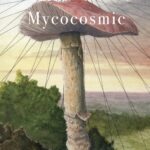 Lesley Wheeler, Mycocosmic, Tupelo Press, March 2025, poetry
Lesley Wheeler, Mycocosmic, Tupelo Press, March 2025, poetry
Without fungi and bacteria, death would overwhelm the planet. In Mycocosmic, Lesley Wheeler’s latest poetry collection, incantatory poems summon transformation after the losses of midlife, including her mother’s death and her grown children launching independent lives. Beneath them runs a book-length essay in verse inspired by mycelia, the fungal networks thriving beneath us, exploring how the processes of grief nourish new life. Wheeler invents a fungal poetics to metabolize secrets, grief, and anger so that life can begin anew.
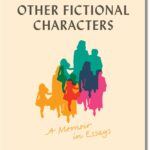 Nicole Graev Lipson, Mothers & Other Fictional Characters, Chronicle, March 2025, creative nonfiction (memoir)
Nicole Graev Lipson, Mothers & Other Fictional Characters, Chronicle, March 2025, creative nonfiction (memoir)
In this intimate and riveting memoir, Best American Essayist Nicole Graev Lipson breaks through the ready-made stories of womanhood, rescuing truth from the fiction that infiltrates our lives. What does it take to escape the plotlines mapped onto us? Searching for clues in the work of her literary foremothers, Lipson untangles what it means to be a girl, a woman, a lover, a partner, a daughter, and a mother in a world all too ready to reduce us to stock characters.
 Andrea Potos, Two Emilys, Kelsay Books, March 2025, poetry (chapbook)
Andrea Potos, Two Emilys, Kelsay Books, March 2025, poetry (chapbook)
Two Emilys is a collection of poems explaining the life and legacies of Emily Brontë and Emily Dickinson, often using a contemporary twist and with commentary from the modern-day poet.
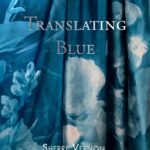 Sherre Vernon, Translating Blue, Poetose, April 2025, poetry
Sherre Vernon, Translating Blue, Poetose, April 2025, poetry
Award-winning author and educator Sherre Vernon’s collection of poems, Translating Blue, explores language, identity, and love, and considers how even in a lifetime of challenge and heartbreak one can find something beautiful and holy in this life. Whether she is writing about motherhood, friendship, sexuality, or swimming, her beautiful poems invite us in so we can’t help but fall into their depths to be held and gently guided along. The collection includes both formal (sonnet, sestina, ghazal) and free verse poetry.
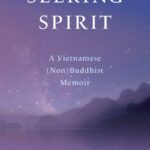 Linda Trinh, Seeking Spirit: A Vietnamese (Non)Buddhist Memoir, Guernica Editions, April 2025, creative nonfiction (essays)
Linda Trinh, Seeking Spirit: A Vietnamese (Non)Buddhist Memoir, Guernica Editions, April 2025, creative nonfiction (essays)
Linda Trinh says she had everything she thought an immigrant woman should want: motherhood, career, and security. Yet she felt empty. Growing up in Winnipeg, Linda helped her mom make offerings to their ancestors and cleaned her late dad’s altar. These were her mother’s beliefs, but was Buddhism Linda’s belief? In her late-twenties, Linda sought answers in Egypt and China and prayed during corporate downsizing, seeking meaning in contemporary life. Via a collection of essays, she plays with form and structure to show the interconnection of life events, trauma, and spiritual practice, to move from being a passive believer to an active seeker.
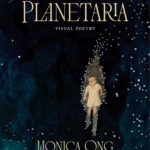 Monica Ong, Planetaria, Proxima Vera, May 2025, poetry (visual poetry)
Monica Ong, Planetaria, Proxima Vera, May 2025, poetry (visual poetry)
Rewriting the sky from a female perspective, Monica Ong invites readers into the intimate cosmology of Planetaria, utilizing the visual language of astronomy to explore the precarious territories of motherhood, women in science, and diaspora identity. This full-color poetry collection examines the power struggles that myth-making elicits through the alchemy of text and image hybrids.
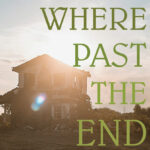 Alexandria Faulkenbury, Somewhere Past the End, Apprentice House Press, May 2025, literary fiction (novel)
Alexandria Faulkenbury, Somewhere Past the End, Apprentice House Press, May 2025, literary fiction (novel)
Alice Greene knows it’s a hoax when the leader of the cult she’s been raised in announces the end of the world. She also knows it’s the perfect chance to escape before he finds out she’s pregnant with the baby she’s not supposed to have. But as she watches his prophecy come true and over 100 members of the group disappear into a plume of smoke and light, all her plans crumble.
Lee Upton, Wrongful, Sagging Meniscus, May 2025, literary fiction (novel)
When the famous novelist Mira Wallacz goes missing at the festival devoted to celebrating her work, the attendees assume the worst—and some hope for the worst. Ten years after the festival, Geneva Finch, an ideal reader, sets out to discover the truth about what happened to Mira Wallacz. A twisty literary mystery dealing with duplicity, envy, betrayal, and love between an entertainment agent and a self-deprecating former priest, Wrongful explores the many ways we can get everything wrong, time and again, even after we’re certain we discovered the truth.
